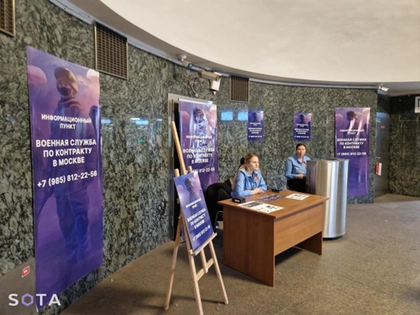Authorities in a Russian region bordering Ukraine have announced the largest recruitment bounty in the entire country to anyone willing to sign a multi-year contract for military service, as part of a Kremlin campaign to refill ranks and retain manpower.
Vyacheslav Gladkov governor of Russia’s western Belgorod region said during a televised Oct. 7 staff meeting that he had issued orders to pay anyone fit and willing to join up for military service the ruble equivalent of $31,000.
JOIN US ON TELEGRAM
Follow our coverage of the war on the @Kyivpost_official.
The payout is more than the typical yearly earnings for a factory worker in the region, a moderately affluent Russian territory with average unemployment and salary levels.
The previous highest bounty offered to volunteers for the Russian army, was the equivalent of $28,000, which is still available in the west Siberian Khanti-Mantaisk region, an oil-rich, high-income region with low unemployment and salaries as much as triple the incomes enjoyed in the rest of the country.
Even in the most expensive and best-paid region in all Russia, greater Moscow, the Astra news agency reported authorities currently offer an army contract signing bounty equivalent to $19,000, just 60 percent of Gladkov’s offer in the relatively rural Belgorod region.
A recruit could bank up to 5.5 million rubles ($57,000) in his first year of service when the bounty and salary are considered. However, Gladkov said that the offer would only be in place until December.

Polish Agricultural Orgs Set to Protest Again
A Kremlin loyalist and a well-known regional Russian politician, thanks to repeated appearances on national media commenting on Ukrainian cross-border strikes, Gladkov said in his personal Telegram channel that Russians needed to be patriotic, that the Motherland was under attack by NATO, and that the bounty offer was also good for any Russian woman willing to sign an army contract.
“If you serve, you will be paid,” Gladkov said, adding that the Russian army was particularly in need of medics.
According to Ukrainian compiled statistics, casualty rates in the Russian army are at the highest recorded during the entire war. Kyiv says that Kremlin forces deployed in Ukraine are losing about 1,200 personnel killed and wounded each day. On Oct. 6, with rates of combat typical for the last 60-90 days, Ukraine’s Army General Staff said the Russian military lost 1,340 soldiers in the previous 24 hours.
Ukrainian army spokespersons have stated they believe their estimates of Russian losses are solid because almost all Russian casualties are recorded and confirmed using drone imagery. Gladkov and other pro-Moscow officials have said that Russian losses are acceptable and that non-Russian sources exaggerate them.
In an Oct. 6 report, the Russian opposition group, Bezvozratniye, said that its reviews of death certificates and funeral announcements found that, since Russia invaded Ukraine in February 2022, at the very minimum 166 Russian military service personnel from Belgorod region had died in combat, and another 966 were missing and very likely dead as well. The actual figure was very likely several times more, that report said.
During the Soviet Union’s twelve-year invasion of Afghanistan, between 118 and 180 Red Army members from Belgorod died in combat. The Ukraine war is, therefore, the Belgorod region’s worst bloodletting since the German invasion and occupation, according to Bezvozratnye’s official figures.
Conscription of young men for wartime service in Ukraine is politically dangerous for the Kremlin which avoids the issue by pushing local government leaderships to cough up volunteers by almost any means, the head of Ukraine’s military intelligence directorate Kyrylo Budanov said.
The independent Russian news platform, Vazhnie Istorii, reported the Russian military’s only real strategy to fill its empty ranks was to offer big cash incentives to attract volunteers. In 2024 the number of those signing contracts was six times higher than in 2023 drawing about 65,000 new recruits a quarter, its Sept. 9 article said.

On the ground, in Russia’s affluent, south-western Krasnodar region, the local government is drumming up recruits with packages roughly on par with Moscow’s. Recruiting pamphlets pedal the idea of regular monthly payments, life insurance and full compensation in case of injury as being “guaranteed.”
“Service in the army is not just one’s duty to the Motherland, but an opportunity to improve the quality of one’s life and the lives of one’s family. The financial support that you will receive, will give you and your family confidence in the future,” one ad said.
In the north-western Leningrad region, surrounding the city of Petersburg, a relative bastion of pro-Western and anti-war feeling, appeals for volunteers focus on simpler priorities, pointing out that Russia’s soldiers get “material support,” “lodging along with meals three times day” and “kill bonuses for destroyed enemy equipment.”
In a Russian Defense Ministry video a tough-looking soldier identified as “Barkas” tells viewers: “Before I signed the contract I had many doubts. But now, after I got military experience, all those questions have disappeared. I just have one task: To wipe out that filth as my grandfather did.”

But along with Kremlin-produced content invoking World War II and Nazis, Russia’s still mostly unregulated internet is awash with videos telling of chaos, inhumanity and daunting mortality rates in modern Russian army service.
An even cursory scrutiny of pro-Russian milbloggers’ channels on the Telegram platform turns up a seemingly endless parade of horror stories about what’s happening to those who join Moscow’s army, which are often a good deal more credible than the Kremlin’s recruitment videos.
A man from Omsk said he was tricked into a frontline unit whose leaders stole his identity. An Ingush mental health sufferer wound up in the infantry because he didn’t understand the papers he was signing. A Nepalese national signed up as a construction engineer but was deployed to the front line.
In a Russian account later verified and repeated by Ukrainian media, a diabetic man 150 centimeters (4 foot 9 inches) tall somehow bypassed the Russian armed forces’ health and height standard and was sent to a combat unit.
Meanwhile, men who have survived years of combat and are ready to go home, report they had their contracts forcibly extended.
Another Russian army recruiting report available on platforms on both sides of the war tell of new recruits being given little or no tactical training by a soldier missing a leg lost in combat in Ukraine. The pro-Russia platform, Dva Majora, responded by saying the soldiers benefited from the man’s fighting experience.
The pro-Ukraine platform, VDV za Chesnost, asked how can a man needing a crutch to walk, teach young soldiers to shoot and move in a battle?
You can also highlight the text and press Ctrl + Enter






